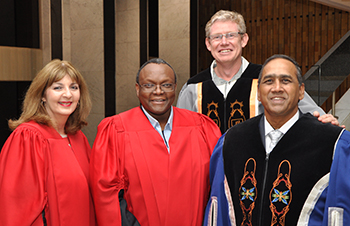Latest News Archive
Please select Category, Year, and then Month to display items
11 September 2024
|
Story Anthony Mthembu
|
Photo Anthony Mthembu and Chelsea Carolus
 From the left: Geraldine Lengau, Senior Officer in the Unit for Institutional Change at the UFS; and Oratile Reina, West College Prime.
From the left: Geraldine Lengau, Senior Officer in the Unit for Institutional Change at the UFS; and Oratile Reina, West College Prime.
As part of the initiatives lined up for College Week, the student leaders of West College at the University of the Free State (UFS) hosted a dialogue that primarily focused on discussing social justice as a value of Vision 130. The dialogue was held at Outeniqua Residence on 3 September 2024 and was well attended by students within West College.
According to Oratile Reina, West College Prime, “the motivation for the dialogue was to prepare newly elected leaders and our college community to align their efforts with Vision 130 – a vision that aims to create a more inclusive, equitable, and socially just environment on campus”. As such, she highlights that the dialogue was an opportunity for leaders to discuss practical strategies for implementing these values in their respective spaces, and to encourage those in West College to become better citizens inside and outside the university.
A conversation on social justice
The dialogue was facilitated by Geraldine Lengau, Senior Officer in the Unit for Institutional Change and Social Justice at the UFS. Lengau touched on several aspects pertaining to the topic of discussion. Firstly, she allowed the audience to give their definition of social justice, especially as students within the institution. In addition, she went on to talk to the audience about sexual assault in the context of social justice. In this instance, Lengau gauged whether the students knew which processes to follow in the event of a sexual assault incident, and whether they were acquainted with the UFS Sexual Harassment, Sexual Misconduct, and Sexual Violence Policy. Furthermore, the audience was given the opportunity to outline what social justice looks like to them in the spaces they occupy, including in their respective faculties, the sports they play, and the leadership structures they form part of. “I was encouraged to see that students take their right to a socially just university in very high regard, and that they were willing to break it down from what Vision 130 proposes, in order to align it with their common understanding,” said Lengau.
As the dialogue concluded, the audience signed a pledge committing to uphold the values of Vision 130. According to Reina, “The pledge represents a promise to take concrete steps towards fostering an inclusive and equitable campus culture. By signing the pledge, the leaders are not only agreeing to embody these principles in their leadership roles but are also holding themselves accountable to their peers and the broader university community.”
Prof Tim Murithi calls for Africa to design new global order
2016-06-02

From left: Prof Heidi Hudson, Head of Centre for Africa
Studies (CAS); Prof Tim Murithi, Extraordinary Professor
at CAS; Prof Lucius Botes, Dean of the Faculty of
the Humanities; and Prof Prakash Naidoo, Principal of
Qwaqwa Campus.
Photo: Stephen Collet
“What do Africans have to say about the remaking of the global order?” was the opening question of Prof Tim Murithi’s lecture which was hosted by the Centre for Africa Studies (CAS) of the University of the Free State (UFS) to celebrate Africa Day on 25 May 2016.
The annual Africa Day Memorial Lecture, entitled: Africa and the Remaking of the Global Order, doubled as Prof Murithi’s inaugural lecture. He is CAS’s newly-appointed Extraordinary Professor, as well as the Head of the Justice and Reconciliation in Africa Programme at the Institute for Justice and Reconciliation in Cape Town. He made a compelling argument for the need for Africa to exert an active influence on international narratives of peace, governance, justice, and reconciliation.
“If we are waiting for American leadership to get us out of the quagmire of a situation we are in, we will be waiting for a long time,” said Prof Murithi.
The Head of the Centre, Prof Heidi Hudson, concurred with Prof Murithi’s suggestion of devising African solutions for African problems. She quoted Audre Lorde’s well-known assertion that “The master’s tools will never dismantle the master’s house.”
Remembering 1963
Over five decades ago, on 25 May 1963, the Organisation of African Unity was formed, and was renamed the African Union in 2002. Africa Day marks this pivotal point in the continent’s history. On this day, we reflect on the continent’s journey into democracy, peace, stability and socio-economic development. It is also an opportunity to celebrate African identity and heritage.
Continent-building dialogues
The UFS Sasol Library celebrated Africa Day with a book launch. Facets of Power. Politics, Profits and People in the Making of Zimbabwe's Blood Diamonds by Tinashe Nyamunda is a reflection of some of the challenges that Zimbabwe continues to face. It details the disadvantaged position which the country finds itself in due to greed, maladministration, and corruption, despite possessing large deposits of minerals.
In celebration of Africa Month, CAS has held a series of lectures by esteemed scholars from across the globe. Earlier in the month, Prof Henning Melber presented lectures on Namibia’s independence and the African middle class. Kevin Bloom and Richard Poplak unpacked the issues surrounding Africa’s continental shift, while Prof Joleen Steyn Kotze focused on the possible fall of the African National Congress.